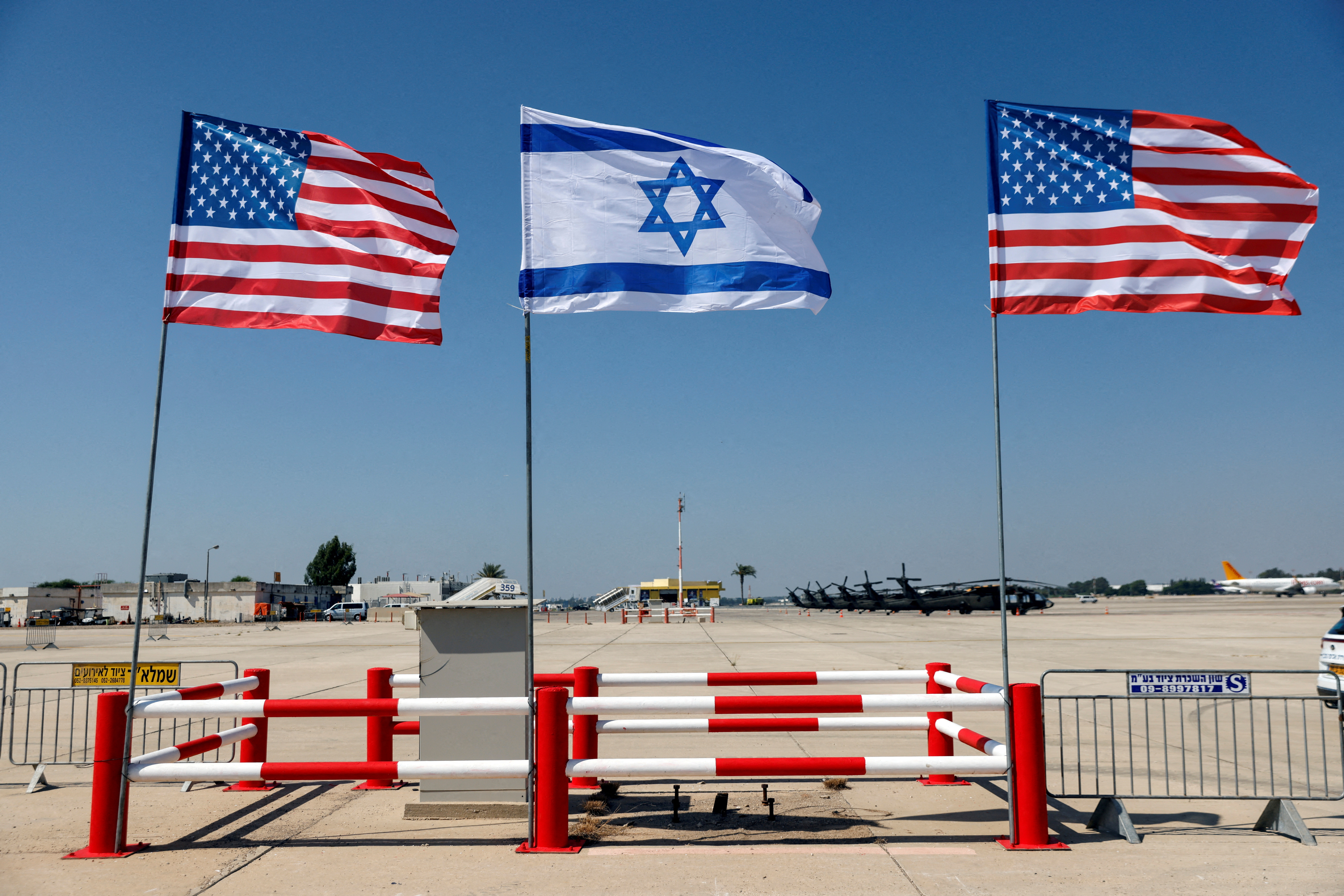
Washington, DC – At first, Lubna was in denial about being refused entry into Israel.
Then, reality – and a deep sense of sadness – set in for the 33-year-old Palestinian American, who had been travelling to the region annually to visit family in the occupied West Bank.
“I fell into a really large depression after that. I had continuous nightmares,” she told Al Jazeera, stressing that being able to visit her Palestinian homeland is central to her identity.
And to Lubna, who asked to be identified only by her first name out of fear of retribution should she attempt to visit Palestine again, the decision in the summer of 2022 seemed arbitrary.
“In the 33 years that I’ve been coming in and out of the country, why am I now seen as a threat to you?” she said.
Lubna’s case is far from isolated as scores of US and other foreign nationals of Palestinian and Arab descent are routinely turned away by Israeli authorities, who control all access to the occupied Palestinian territories.
But it comes as the administration of US President Joe Biden has been pushing to admit Israel into the US Visa Waiver Program (VWP), which would allow Israeli citizens to travel visa-free to the United States.
While US officials insist that Israel would, in turn, be required to offer all US citizens visa-free travel into Israel and the occupied West Bank, many Palestinian- and Arab-American activists are sceptical that Israel will live up to its commitments. They also worry the country’s admission to the programme will create a tier of “second-class” US citizens.
#Thread: The US-Israel #VisaWaiver MOU is an outrage. It is an insult to Arab Americans, including Palestinian Americans, given Israel’s decades of discriminatory entry/exit treatment. #NoWaiver4Israel 1/8
— Arab American Institute (@AAIUSA) July 19, 2023
“By admitting Israel into the VWP in violation of statutory requirements, the Biden Admin will choose to abandon the rights of Arab American citizens to give Israel a political perk,” the Arab American Institute, a think tank in Washington, DC, said in a social media post last week.
“This decision is an egregious breach of responsibility owed by the US gov’t to its citizens.”
The programme
Established in 1986, the VWP applies to 40 countries, largely from Europe, whose citizens are allowed to stay in the US for up to 90 days without a visa.
“In return, those 40 countries must permit US citizens and nationals to travel to their countries for a similar length of time without a visa for business or tourism purposes,” the Department of Homeland Security says in a fact sheet describing the programme.
Reciprocity – the idea that foreign countries will treat all US citizens equally and without discrimination just as their nationals would be treated at American ports of entry – is a key element of the VWP.
And US officials often stress that “blue is blue”, referring to the colour of the American passport and all the privileges it entails regardless of the passport holder’s background.
Last week, US and Israeli officials signed a memorandum of understanding to facilitate Israel’s entry into the programme before a final decision is made at the end of September.
However, even if fully implemented as intended, experts said Israel’s admission into the programme could still possibly violate the US Constitution, which requires equal treatment under the law.
For instance, the memorandum, a copy of which was shared with Al Jazeera, acknowledges Israel’s right to deny admission to Americans based on “legitimate security concerns”, a caveat that advocates say Israel may easily abuse to target Palestinian rights supporters.
Abed Ayoub, executive director of the American Arab Anti-Discrimination Committee (ADC) advocacy group, said the security exception raises several worrying questions.
“If Israel says a certain traveller has a security issue, will the US government start using that adversely against that person? This opens up so many concerns. And it’s just shocking that it has even come this far,” Ayoub told Al Jazeera.
Ayoub added that the entire push for Israel to join the VWP is unprecedented. “The US is essentially creating a second class of US citizens there. This is a sign-off on the apartheid policies,” he said.
‘Different categories of people’
The memorandum, which does not impose formal requirements on either the US or Israel, does not grant Americans the right to enter or exit the Gaza Strip even if they are residents of the besieged Palestinian territory.
Often described as the world’s largest open-air prison, Gaza has been blockaded since 2005 by Israel, which controls most of the territory’s land crossings, airspace and territorial waters. Egypt, which controls one crossing into southern Gaza, has also mostly closed that border.
Zaha Hassan, a human rights lawyer and fellow at the Carnegie Endowment for International Peace, said Washington is practically sanctioning the indefinite closure of Gaza and enshrining it into the VWP.
She added that the memorandum of understanding sets up different rules for Gaza, the West Bank and Israel, overlooking the fact that the Israeli government controls the entire territory between the Jordan River and the Mediterranean Sea.
“We’re ignoring the reality of who controls that area and carving out different exceptions and creating different categories of people who will be included in the Visa Waiver Program and who will be outside of the benefits and obligations of the Visa Waiver Program,” Hassan told Al Jazeera.
Israel also has a law prohibiting entry to people who publicly call for boycotting Israel, and it is not clear if those regulations would be suspended for US citizens if Israel joins the VWP.
In 2019, Israel did not allow US Congresswomen Ilhan Omar and Rashida Tlaib to visit the country and the occupied Palestinian territories, citing “their boycott activities against Israel”.

For her part, Lubna, who is a small-business owner, said she was denied entry on security grounds, a move she said she believes was likely linked to her past anti-occupation activism in the US.
After being turned away, Lubna stayed at Israel’s Ben Gurion Airport near Tel Aviv for three days as she pushed to retrieve her luggage. During that time, she contacted US officials and her representatives in Congress, but she said “nothing happened”.
“The US also doesn’t f****** care. They don’t care that their Palestinian citizens are being denied entry into one of the largest military bases in the world,” she said.
Trial period
US officials have largely refrained from discussing the details of Israel’s entry into the VWP, including what it would mean for travel to Gaza, movement within the West Bank and the treatment of US citizens who reside in Palestine.
But the State Department has stressed the broad premise that reciprocity would be enforced. For now, Washington has said it will monitor Israel’s compliance until September 30 before making a final decision.
“Israeli authorities have assured us that all US citizens, even those on the population Palestinian registry, will be eligible for visa-free travel. Israel’s regulations and public-facing guidance should reflect this understanding,” State Department spokesman Matthew Miller told reporters last week.
In March, Israeli Prime Minister Benjamin Netanyahu hailed the passage of a law to enhance travel data-sharing with the US to fulfill VWP conditions.
“In the coming months, we will meet additional requirements and in September 2023, the State of Israel is expected to join the list of countries that are exempt from US visas,” Netanyahu said in a statement without addressing the issue of treating all American citizens equally.
Palestinian advocates in the US have questioned what incentive Israel will have to maintain the concept of reciprocity after it is admitted to the programme – and refrain from continuing its decades-long policy of turning away people at its borders.
Israel regularly denies entry to Americans and Westerners of Palestinian and Arab descent as well as student activists and human rights campaigners who have spoken out against Israeli policies towards Palestinians.
While there are no clear statistics on what percentage of US Arab and Palestinian visitors to Israel are refused entry, the country turned away nearly 19,000 people of all nationalities in 2018, according to Israeli media reports.
“Of course, Israel can for a temporary few weeks modify its behaviour and its implementation of existing laws and military regulations in order to get into the programme and then go back to its normal practices,” Hassan said.
“And we all know that politically it’s very difficult to take away a benefit from a country like Israel once it’s given.”
Others also have criticised Washington for considering Israel’s admission now when deadly violence against Palestinians in the West Bank and efforts to strip the Israeli judiciary of its powers have ramped up under Netanyahu’s far-right government.
“America is always rewarding Israel for bad behaviour,” Lubna said.
‘Humiliated’
Meanwhile, many Palestinian Americans – who have for years complained of Israel’s prolonged interrogations and detention at its main airport and land crossings – are concerned that Israeli authorities may continue to abuse them.
Tala, a Palestinian-American law student who also asked to be identified by her first name only for fear of retribution, said she was held for seven hours at Ben Gurion Airport before being allowed into the country this year.
Tala said that as she arrived at customs, she and other Arab and Palestinian travellers were pulled aside for further questioning in an area she jokingly called the “POC room”, referring to people of colour.
“I had an American passport all the same as all the other white women that I walked in with, and yet I was the one who was taken in and humiliated and interrogated for seven hours on the basis of being Palestinian,” she told Al Jazeera.
“And so I think the US is very clearly not standing on its own principles in this regard of telling Israel that it has to treat all American citizens equally.”







